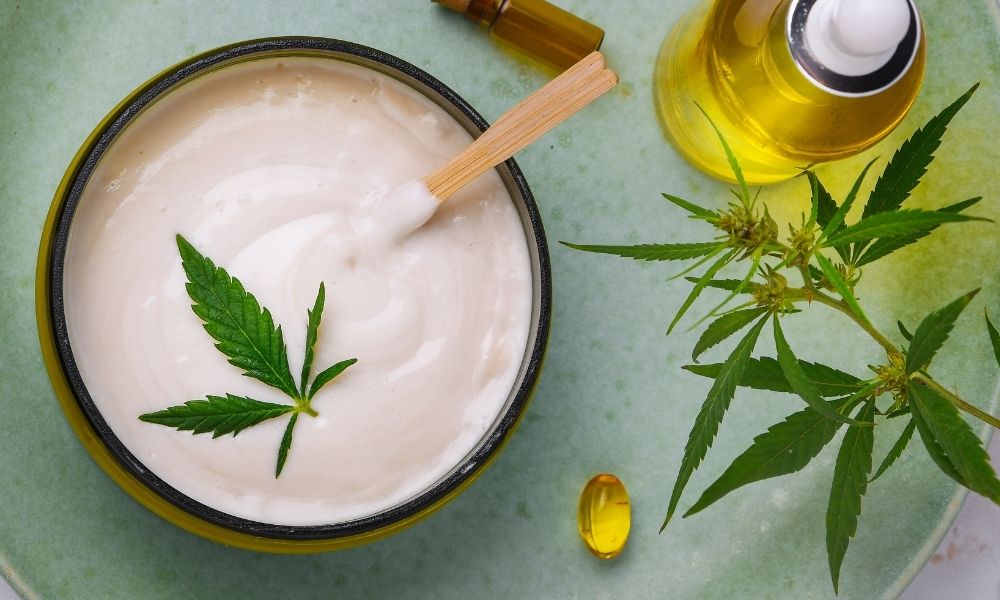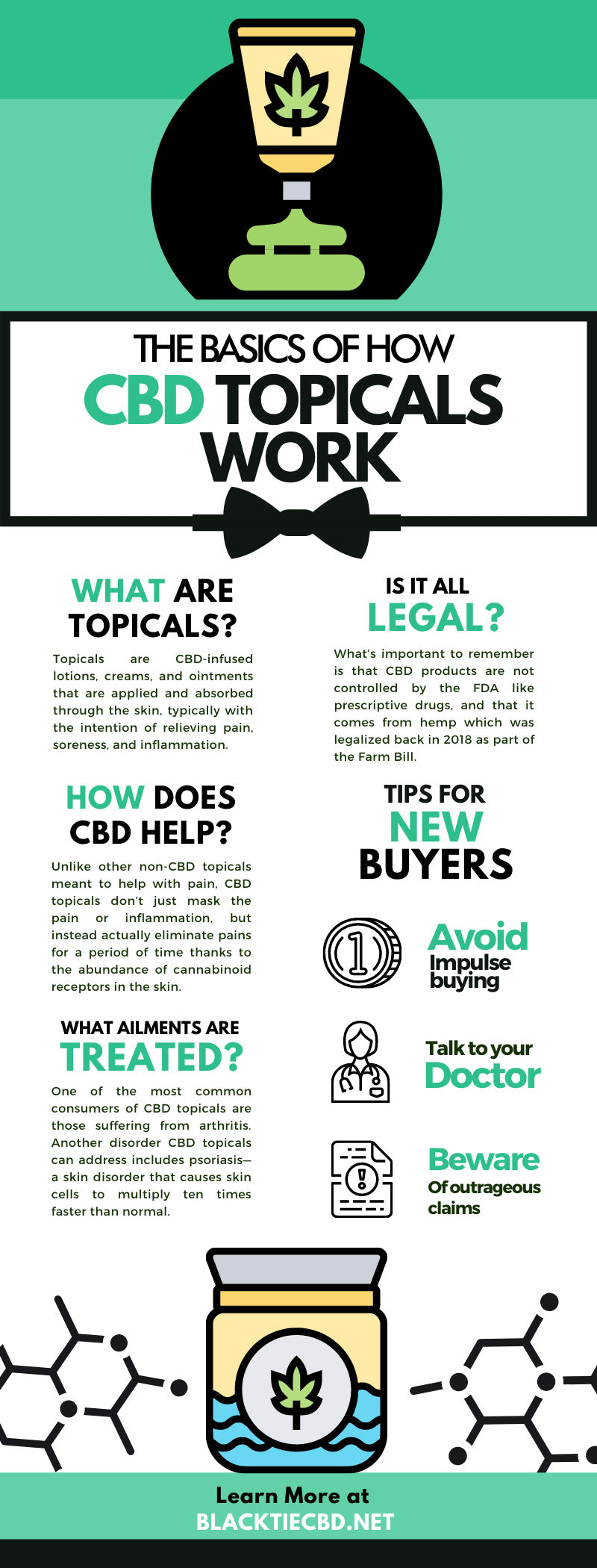How To Use CBD Oil Topically
February 19, 2021

Since 2018 and the legalization of cultivation and extraction of CBD flower, we’ve entered into a CBD renaissance in which the options for CBD products are seemingly endless. Lots of people are now looking for an easy and effective way to incorporate CBD products into their daily routines but figuring out how to do it can be challenging for beginners. Plus, there are so many options, which may make it hard to decipher the legitimate information from that which is less clearcut. If you’re looking to use CBD to help you feel better, we recommend starting with topical CBD oil. Discover how CBD oil could help you and how to use CBD oil topically!
What are CBD Oil Topicals?
CBD oil is created by extracting CBD from plants and diluting it with a carrier oil like hemp seed or coconut oil. CBD products are available in a wide variety of categories, including bath bombs, nutritional supplements, foods, beverages, smokables, and more both online and in brick-and-mortar stores.
CBD oil can be applied topically, directly to the skin. When applied topically, CBD oil gets absorbed into the skin by connecting with cannabinoid receptors through the skin’s pores rather than entering the bloodstream.
How Does CBD Oil Help?
Transdermal solutions of applying CBD topically work to relieve pain by binding to cannabinoid receptors. These receptors can be found throughout your body and are typically triggered by your body’s own natural production of endocannabinoids. These endocannabinoids regulate processes within the body, such as immune response, communication between cells, appetite, and memory.
CBD oil may trigger these receptors to supplement your body’s natural processes, which makes up most of the basics of how CBD topicals work. Unlike other non-CBD topicals meant to help with pain, CBD oils don’t just mask the pain or inflammation; instead, they address pain and/or inflammation at its core to get to the root of the problem.
What Ailments do CBD Topicals Treat?
So far, we’ve talked a little bit about how CBD topicals relieve pain and soothe inflammation, but those are often just symptoms of a greater issue. Let’s go into specifics about how CBD can help with certain conditions.
One of the most common consumers of CBD topicals are those suffering from arthritis. Arthritis is caused by inflammation and is most effectively treated with a salve that makes use of CBD and THCA, both of which have anti-inflammatory properties. Not to be confused with its active state in which is causes that euphoric high, THC left in its acid form and combined with CBD can make for a powerful anti-inflammatory solution.
Another disorder CBD topicals can address includes psoriasis—a skin disorder that causes skin cells to multiply ten times faster than normal. This causes a buildup of irritating bumpy red patches with white scales as a result of an irregularity in the immune system. Topicals can help solve this by being applied directly to the affected skin, as they help your immune system regain proper control.
Lastly, we’ll talk more about intense localized pain to specify effective chemical profiles for the right topical. For intensive pain that isn’t fully solved via a simplistic CBD topical, you could instead combine the cannabinoids with a warming balm to create a tingling, soothing sensation in place of the pain as the cannabinoids work to relieve the pain. This also makes for a good solution to reduce sores and aches the morning following an intense workout.
Are CBD Oil Topicals Legal?
It’s understandable that a common concern for the uninitiated is the legality of CBD thanks to its close association with marijuana. What’s important to remember is that CBD products are not controlled by the FDA like prescriptive drugs, and that it comes from hemp which was legalized back in 2018 as part of the Farm Bill. As a relatively recent bill, this has left some confusion among states as to how they should regulate CBD, if at all. It’s a good idea to check what your state’s laws and regulations are concerning CBD, but most products are made from CBD extracted from hemp, lack THC, and should be entirely legal to acquire.
Dosing CBD Oil Topically
With topical CBD oils, dosage isn’t quite as important as with other forms of CBD because its application is so specific and localized. Still, it can be useful to have an idea of how much of a topical to use to avoid waste.
When it comes to learning how to use CBD oil correctly, a good rule by which to abide is remembering that less is more. A small drop of CBD oil can go a long way if you concentrate on some of the key areas of your body. These locations include:
- The neck and shoulders
- The soles of feet
- The temples and nose
- Joints such as your elbow and knees
While these are common points of pain, tension, or inflammation, topical CBD oil is not restricted to these areas. You can apply the CBD oil to almost any problem spot.
Another good tip for dosing topical CBD oil is to start off by trying a little bit and waiting about an hour. If you don’t feel any meaningful effects in that time, try applying a bit more. All in all, feel free to experiment as much as you please to find out how much you need to apply.
CBD for Pain Relief
So far, we’ve talked a little bit about how CBD oils relieve pain and soothe inflammation, but those are often just symptoms of a greater issue. Let’s go into specifics about how CBD can help with certain conditions.
CBD oil is popular amongst athletes for soothing pain caused by injuries or strains while out on the field. CBD oil is typically applied to a specific area rather than being dispersed across the body, which means the effects may be more pronounced in those individualized areas.
Topical CBD oil is also becoming more popular for those who suffer from painful skin conditions such as acne, itching, and scarring. For acne in particular, CBD oil can help reduce or compensate for the hormones within a developing body to soothe the effects of acne or prevent it entirely. Furthermore, CBD interacting with the endocannabinoid system regulates the production of cortisol, a stress-inducing hormone, which can play a factor in the creation of acne.
CBD for Infections
Some find that CBD oil may also be useful for helping with infections. In combination with its natural anti-inflammatory properties, CBD contains antimicrobial and antibiotic properties, making for a powerful treatment against infections with the two working together.
Some of the infections CBD can help treat include:
- Bug bites
- Cuts and scrapes
- Burns
- Bacterial infections
- General skin infections
CBD for Arthritis
Some of the most common users of CBD oils are those suffering from arthritis. Arthritis is caused by inflammation and is most effectively treated with a salve that makes use of CBD and THCA, both of which have anti-inflammatory properties. Not to be confused with its active state in which it causes that euphoric high, THC left in its acid form and combined with CBD can make for a powerful anti-inflammatory solution.
CBD for Relaxation
Many people need a little extra support relaxing at the end of a long day. Stress often causes tension within our muscles that can be difficult to get rid of and even more difficult to relax with. While CBD is best renowned for promoting feelings of calm and serenity, CBD oils in particular could help alleviate stress, especially when applied topically on a site of tension. Topical CBD oil could help loosen up your muscles to the degree that you can finally relax without aches and pains constantly nagging you.
Is it all Legal?
It’s understandable that a common concern for the uninitiated is the legality of CBD thanks to its close association with certain herbs. What is important to remember is that CBD products are not controlled by the FDA like prescriptive drugs, and that it comes from dry herbs which was legalized back in 2018 as part of the Farm Bill. As a relatively recent bill, this has left some confusion among states as to how they should regulate CBD, if at all. It is always a good idea to check what your state’s laws and regulations are concerning CBD. Still, most CBD products made from purely CBD do not have THC and should be legal to acquire.
Tips for New Buyers: Picking a CBD Oil for Topical Use
So how can you find the best CBD oil for you? There are a few factors to consider when comparing topical CBD oils, the first of which is quality control. You want to look for the vendors that will display the results of their product from third-party lab tests and have Good Manufacturing Practice-compliant facilities—the standards set by the FDA.
Next is the extraction method. There are different ways to extract CBD from plants that produce different results. We wouldn’t expect you to be familiar with each extraction method, so we recommend you look for CBD oils extracted using CO2 or ethanol extraction, as they are the most reliable for consistently high-quality products.
Strength and potency also should be considered. CBD potency is expressed differently in various CBD products. This is not to be confused with the proportion of CBD in the product, which is about purity, not potency. Look for milligrams (in topicals) or milligrams per milliliter instead (for oils and isolates). The greater the number, the more powerful the product.
When looking for a quality CBD oil topical, beware of outrageous claims. As with many unregulated health products, there are bound to be people promising “miracle cures and benefits”; be wary of these.
Lastly, talk to your doctor. It’s always a good idea to inform your doctor that you’re considering CBD oils. They may have some insight to help guide you towards the right product, which could be especially important if you have pre-existing or underlying conditions that require medication. Although this is less of a concern with topical CBD oil than other types of CBD, interactions with medication can occur, so it is always best to consult a medical professional for any questions.


